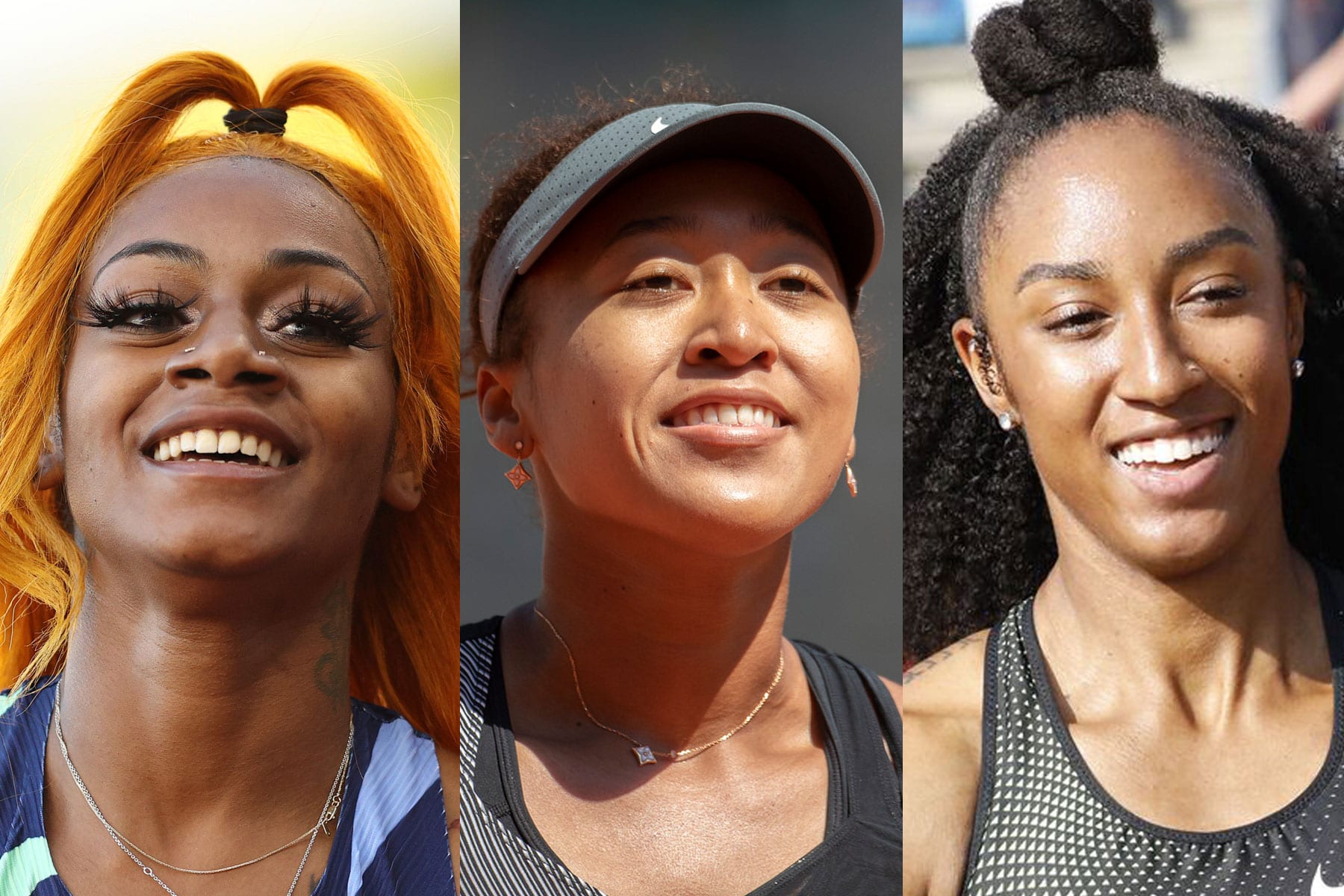Sha’Carri Richardson, a star sprinter, smoked marijuana as she processed news of her biological mother’s death.
Brianna McNeal, a 2016 Olympic champion, didn’t answer her door in the days she physically and emotionally recovered from an abortion.
Naomi Osaka, the world’s number two tennis star, declined media interviews to protect her mental health.
These three athletes, all women of color, were barred from competition or fined after making a personal choice about how to handle their health. Their circumstances show how disparities in mental health resources are failing Black women athletes in a system that doesn’t take them into consideration, mental health experts tell The 19th.
“Finding weed is a lot easier than finding a Black therapist,” said Imadé Nibokun Borha, founder of nonprofit Depressed While Black, which has connected nearly 200 clients to Black therapists. “The access to care isn’t there. The access to mental health services isn’t there.”
A lot of Black women athletes “are expected to be these indestructible, strong, superhuman people,” she said. “But sometimes when you’re expected to be superhuman, that’s dehumanizing.”
Borha pointed to a tweet Richardson sent on Thursday: “I am human.”
“We should not have to say ‘I am human.’ We should already be treated that way. But so often, if we’re not contributing labor, if we’re not allowing our bodies to be policed, then we’re kicked out,” Borha said.
Richardson told the TODAY Show in an exclusive interview that she ingested marijuana while in Oregon — where it’s legal, and where Richardson was for the Olympic trials — after learning from a reporter that her biological mother had died.
She received a one-month suspension from the U.S. Olympic team after testing positive for THC, a chemical found in marijiuana, and her name was not on the roster for Tokyo that was released Tuesday afternoon. That final roster made her ineligible for the 4×100 relay team.
“To put on a face, to have to go in front of the world and put on a face and hide my pain — like, who are you, or who am I, to tell you how to cope?” she told the TODAY Show.
Richardson said she was grappling with her mental health leading up to the games — and that learning of her biological mother’s death “from a complete stranger” was a triggering experience that sent her into “a state of emotional panic.”
Despite the “nerve-shocking” news given days before the trials, as she described it, she still had to compete.
“I still have to go out and put on a performance for my dream, go out there and still compete,” she said. She felt, she said, “just blinded by emotions, blinded by sadness, blinded by just hurting, hiding hurt, honestly.”
USA Track & Field, in a statement Friday, pledged to provide Richardson with “ample resources to overcome any mental health challenges now and in the future” and called the situation “incredibly unfortunate and devastating for everyone involved.”
Finding weed is a lot easier than finding a Black therapist.
Imadé Nibokun Borha, whose nonprofit organization, Depressed While Black, connects clients to Black therapists.
“Athlete health and well-being continue to be one of the USATF’s most critical priorities,” the organization said. On Tuesday, after declining to add Richardson to its Tokyo roster, it said in a new statement that anti-doping THC rules should be reevaluated in the future.
McNeal also lost her shot at competing in Tokyo — and any chance at Paris in 2024. The Court of Arbitration for Sport upheld a five-year competition ban, which was issued last month, last Friday against her for “tampering or attempted tampering with any part of doping control.” The New York Times reported last week that she missed a doping test at her home in January 2020 because she was in bed recovering from an abortion that she had not previously planned to divulge to the public.
“I don’t think that they thought about my mental health at the end of the day,” McNeal told The 19th on Wednesday. She said that in July of last year, she told her therapist over a text message that she wanted to disappear — which is how she felt for much of the year.
“I know that I was not in a good mental headspace at all, like I was drowning inside. And not a lot of people knew that,” she said, adding that when she tried to express her feelings to the Athletics Integrity Unit (AIU), she was met with interrogation and criticism instead of empathy.
McNeal, who had qualified for her second stint on the U.S. Olympic team after placing first in the 100-meter hurdles in 2016, told The Times and The 19th that her appeal was lost after she mistakenly changed the date of her abortion on paperwork submitted to the AIU.
After missing the doping test in 2020, the AIU asked McNeal for an explanation. As investigators asked McNeal for documentation to corroborate when she had had an abortion, they made her repeatedly relive a private, emotional moment that she had not shared extensively — one that she was voluntarily telling them about.
She was not required to tell the investigative unit why she had missed the drug test on January 12, 2020, since she had only missed two tests within a 12-month period — not enough for a violation.
“I didn’t have to dispute it. Looking back, I wish I never did,” she said, adding that her aim to be transparent with investigators had led to a situation that didn’t need to happen.
World Athletics, governing body for track, argued in its case against McNeal that “it didn’t believe she was so traumatized by the abortion that she got the date of the procedure wrong,” since she had been competing and posting on social media in the following weeks, The Times reported.
McNeal told The 19th she was not asked specific questions by investigators to determine her level of trauma.
She said she felt alone during virtual hearings for her case, during which she had to explain her decisions to three White investigators — two men and a woman. “I just saw myself in a room full of people that don’t look like me,” she said.
One of McNeal’s lawyers, Lindsay Brandon, told The 19th that she found the process lacking in empathy.
“The AIU, who investigated this and also decided to prosecute it, all of those people involved in that decision making process were White European males,” Brandon said. “They couldn’t have possibly understood her mental state.”
Borha said this — and Richardson’s treatment — feeds into the unconscious perception of Black women as “instruments of labor.”
“I think they are really terrified of Black women not being compliant,” she said. “It’s the constant policing of our bodies because they know they make money off of it … And I think that they are really terrified of Black women being free and putting themselves first. Because it would dismantle the whole system.”
McNeal told The 19th that mental health resources should be more accessible for her and all athletes at her level.
“As a pro Olympian, a world champion, I feel like there should be more resources to help me, to point me to somebody, instead of me having to look on my own for a therapist,” she said.
Mental health was the primary reason Osaka cited when she withdrew from the French Open and Wimbledon, two of the most important competitions in tennis. Osaka, who had already made clear her discomfort with post-game press conferences, said she “often felt that people have no regard” for the athletes’ well-being.
“In any other line of work, you would be forgiven for taking a personal day here and there, so long as it’s not habitual,” she said in a TIME magazine essay on Thursday. “You wouldn’t have to divulge your most personal symptoms to your employer; there would likely be HR measures protecting at least some level of privacy.”
Osaka’s situation raised a pressing question for Lauren Miller, a mental health specialist for Tulane University with a doctoral focus in athletic retirement: “What happens when the institution itself is also the one that is perpetuating or exacerbating the symptom, if not the problem?”
When athletes are penalized for being human in the face of their contractual obligations — like speaking to the press or taking a drug test — answering their specific needs can be tricky, she said.
“I don’t know if there’s an answer there, because we’re trying to standardize something and be inclusive at the same time, and clearly, our society is still learning to do both,” Miller said.
She sees the predicaments of these three women as the start of a larger conversation on how sport institutions should work with athletes as individuals, which means offering individualized mental health resources instead of blanket options.
“I look at the courage of these three women, and as unfair as many might feel it to be that they had to share their own personal experiences, their own personal information — their courage to do that, how powerful is that to continue this momentum forward,” she said.
“This is what brings us to talking about it,” Miller said, adding that these discussions would not be happening if the three women had just kept quiet.







